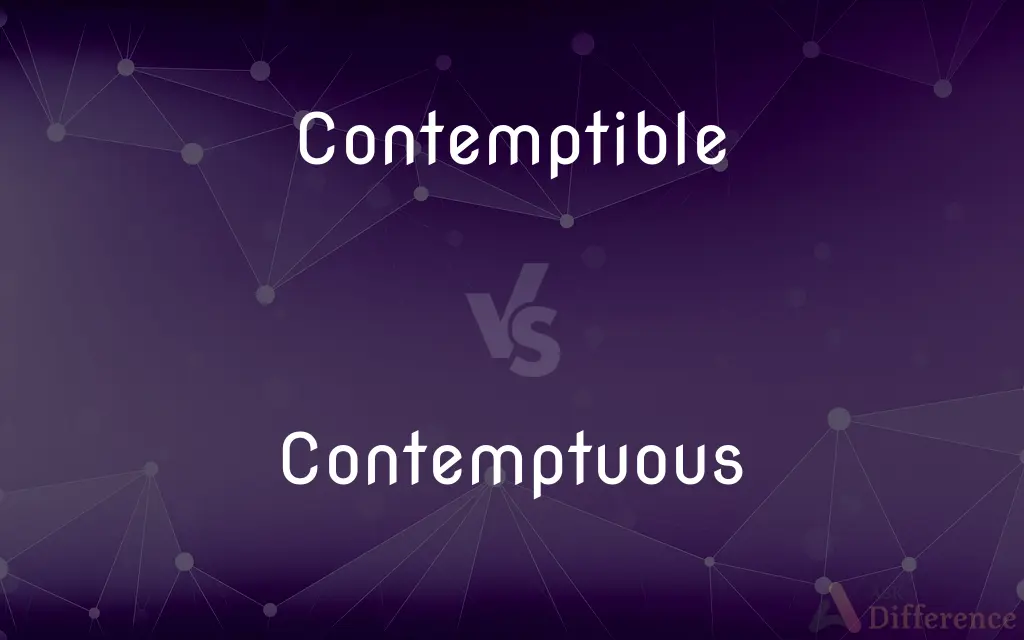Contemptible vs. Contemptuous — What's the Difference?
By Tayyaba Rehman & Maham Liaqat — Updated on April 2, 2024
Contemptible refers to something deserving scorn due to lack of value or morality, whereas contemptuous describes an attitude of disdain or scorn towards someone or something.

Difference Between Contemptible and Contemptuous
Table of Contents
ADVERTISEMENT
Key Differences
Contemptible is used to describe something or someone that is deemed unworthy of respect or is despicable due to its qualities or actions. This term focuses on the inherent worth or morality of the subject, suggesting that it is deserving of contempt because of what it is or has done. On the other hand, contemptuous is an adjective that describes a person's attitude or behavior that shows scorn or disdain towards others. It is about the perspective or reaction one has towards something rather than the inherent qualities of the thing itself.
While contemptible objects or persons are judged based on their lack of value, contemptuous individuals are characterized by their dismissive or scornful attitudes. Therefore, something contemptible is viewed through a moral or value-based lens, indicating its despicableness, whereas contemptuous behavior is about the emotional or psychological state of derision directed towards another.
Contemptible actions or traits provoke disdain or disrespect from others due to their nature. In contrast, a contemptuous look or remark emanates from a person's feelings of superiority or disapproval, reflecting a judgmental and scornful stance.
Considering something contemptible involves a judgment on its character or actions as being beneath consideration, vile, or deserving of scorn. Conversely, being contemptuous reveals a person's disdainful or scornful attitude, which could be directed towards something they perceive as contemptible or beneath them.
Contemptible and contemptuous both involve negative assessments, but from different perspectives: one concerns the object of scorn for its qualities, while the other concerns the subjective attitude of scorn towards the object.
ADVERTISEMENT
Comparison Chart
Definition
Deserving scorn due to lack of value or morality.
Showing or feeling disdain or scorn towards others.
Focus
On the object’s qualities or actions.
On the observer’s attitude or reaction.
Nature
Inherent worth or morality of the subject.
Emotional or psychological state of derision.
Common Usage
Describing actions, qualities, or entities.
Describing attitudes, expressions, or tones.
Perception
Viewed through a moral or value-based lens.
Reflects a judgmental and scornful stance.
Compare with Definitions
Contemptible
Implies something is worthy of scorn because of its nature.
Cheating is a contemptible shortcut to success.
Contemptuous
Showing or feeling disdain or scorn towards others.
Her contemptuous glance made him regret his words immediately.
Contemptible
Often involves a moral or ethical evaluation.
Betrayal is among the most contemptible of acts.
Contemptuous
Reflects a person’s disdainful attitude.
His contemptuous remarks about the project demoralized the team.
Contemptible
Deserving scorn due to lack of value or immorality.
The thief’s contemptible act of stealing from the poor shocked the community.
Contemptuous
Indicates an expression of disdain or scorn.
He gave a contemptuous laugh when he heard the proposal.
Contemptible
Pertains to the object’s despicableness.
The movie’s contemptible villain was universally hated by the audience.
Contemptuous
Pertains to the observer’s scornful reaction.
The critic’s contemptuous review of the film sparked controversy.
Contemptible
About being unworthy of respect or despicable.
His contemptible behavior made him a pariah in his own family.
Contemptuous
Centers on the individual’s judgmental stance.
Despite her success, she remained contemptuous of her humble beginnings.
Contemptible
Deserving of contempt; despicable.
Contemptuous
Manifesting or feeling contempt; scornful.
Contemptible
(Obsolete) Contemptuous.
Contemptuous
Showing contempt; expressing disdain; showing a lack of respect.
I don't know that guy, but he just gave me a contemptuous look.
Contemptible
Contempt.
Contemptuous
Manifesting or expressing contempt or disdain; scornful; haughty; insolent; disdainful.
A proud, contemptuous behavior.
Savage invective and contemptuous sarcasm.
Rome . . . entertained the most contemptuous opinion of the Jews.
Contemptible
Worthy of contempt; deserving of scorn or disdain; mean; vile; despicable.
The arguments of tyranny are ascontemptible as its force is dreadful.
Contemptuous
Expressing extreme contempt
Contemptible
Despised; scorned; neglected; abject.
Contemptible
Insolent; scornful; contemptuous.
If she should make tender of her love, 't is very possible he 'll scorn it; for the man . . . hath a contemptible spirit.
Contemptible
Deserving of contempt or scorn
Contemptible
Worthy only of being despised and rejected;
A contemptible lack of courage
A little, wretched, despicable creature, a worm, a mere nothing...that has risen up in contempt against the majesty of Heaven and earth
Common Curiosities
Can a person be both contemptible and contemptuous?
Yes, a person can be contemptible by their actions and contemptuous in their attitude towards others.
How does contemptuous behavior manifest?
Contemptuous behavior manifests through disdainful attitudes, expressions, or tones towards someone or something.
What does contemptible mean?
Contemptible describes something or someone as deserving scorn due to its lack of value or immorality.
What does contemptuous mean?
Contemptuous refers to an attitude or behavior that shows disdain or scorn towards others.
Is contemptible a judgment on character or actions?
Contemptible is a judgment on both character and actions, focusing on their lack of value or morality.
Is being contemptuous always negative?
While typically viewed negatively, being contemptuous can be a natural response to contemptible behavior.
Is contemptible used more in legal or moral contexts?
Contemptible is primarily used in moral contexts to describe despicable actions or qualities.
How do societal values affect what is considered contemptible?
Societal values play a significant role in determining what actions or qualities are considered contemptible.
Can contemptuous attitudes be justified?
Contemptuous attitudes can sometimes be justified if directed towards genuinely contemptible actions or traits.
Can contemptuous attitudes change over time?
Yes, contemptuous attitudes can change as individuals reassess their perceptions and judgments.
Can something be contemptible but not illegal?
Yes, many actions or qualities can be contemptible without being illegal, such as certain unethical behaviors.
Why might someone display a contemptuous attitude?
Someone might display a contemptuous attitude due to feelings of superiority, moral disapproval, or personal disdain.
Does contemptible imply a moral failing?
Yes, something contemptible often implies a moral or ethical failing.
Is it possible to reform from being contemptible?
Yes, individuals can reform their actions and attitudes to no longer be considered contemptible by society.
How do cultural differences impact perceptions of what is contemptible?
Cultural differences significantly impact perceptions of contemptibility, as moral and ethical standards vary across cultures.
Share Your Discovery

Previous Comparison
Beaver vs. Nutria
Next Comparison
Agate vs. OnyxAuthor Spotlight
Written by
Tayyaba RehmanTayyaba Rehman is a distinguished writer, currently serving as a primary contributor to askdifference.com. As a researcher in semantics and etymology, Tayyaba's passion for the complexity of languages and their distinctions has found a perfect home on the platform. Tayyaba delves into the intricacies of language, distinguishing between commonly confused words and phrases, thereby providing clarity for readers worldwide.
Co-written by
Maham Liaqat















































